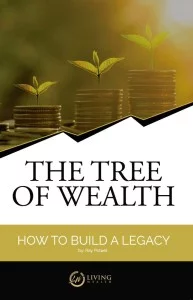In this episode, we discuss the fundamentals of ensuring a better financial future. We’ll dive seeing the reality of your financial situation. And you’ll learn how it’s easy to achieve your goals when you have a solid understanding of where you’re at right now.
Today’s episode is exciting for us to do because it relates very much to something we do every day with the people. We try to help people get more comfortable with talking about money and bring a clear reality to where they’re at. From there we can show them that it really is possible to get out of any financial situation that you found yourself in.
The first step is just finding out where you’re at. This is what we mean by reality. So, we’re going to talk about seeing this reality and how to build roadmaps that lead you to success.
But first, we unravel why some people afraid to talk about where they’re at financially. And we’ll uncover why they’re afraid of money in the first place.
Ensuring a Better Financial Future Topics Discussed:
- Overcoming the fear of looking at and talking about money
- Understanding where your dollars are going and why
- Overcoming the fear of asking for help with money
- Why people avoid outside advice
- What a financial GPS is and how to use to get financially unstuck
- Building a roadmap out of trouble
Want Financial Freedom?

Start your journey to financial freedom with this first step.
Get our 122 page eBook The Tree of Wealth here now.
Episode Takeaways:
Podcast transcript for episode 30: Ensuring a Better Financial Future
Nate: In this episode, we will discuss how to bring a sense of reality to your financial situation, and also why it’s so easy to achieve your goals when you have a solid understanding of where you’re at right now. She’s Holly, and she helps people find financial freedom.
Holly: He’s Nate. He makes sense out of money. This is Dollars and Nonsense. If you follow the herd, you will be slaughtered.
Nate: All right, so today’s an exciting episode for us to do because it relates very much, and Holly would agree, to something we do every day with the people that we work with, and that’s try to help people get more comfortable with talking about money and bring reality to where they’re at and show them that it really is possible to get out of any financial situation that you found yourself in. The first step is just finding out where you’re at. So, we’re going to talk about bringing reality and how to build road maps that lead you to success. So, Holly, I guess I ask you a question, why are some people afraid to talk about where they’re at and why they’re afraid or maybe hopeless with money in the first place? I mean, what brings people to that point?
Holly: Well, I think partly, a feeling of failure, like they failed somehow, because a lot of us … Actually, we’re not living within our means. We’re at a stage where we have no understanding of where all of our dollars are going. We know we’re getting paid, we know we’re getting paid good money, but yet it seems like even if we get a pay raise, that money’s just gone instantly. I think the reality is we’ve actually never stopped and been told where to look at, not just where you want to go, but where are you financially; where are you at right now? Where is that money going to?
And we have a lot of clients, I think you would agree, Nate, that actually, they know where they want to go, but oftentimes they actually do not comprehend what is leaving their bank account every month and how much money’s going to other people versus to themselves or just for living, like food and clothing. I mentioned it a lot lately, but just the fact or reality that most American families today are spending more money on food and eating out than they are in a grocery store, and you don’t realize the dollars you’re spending in a week just by eating out.
Nate: Yeah, it’s really easy, and I think that a lot of people … If you’re listening to this and you would say you’re not where you want to be, you made some mistakes, your financial life is just haphazard … I think a lot of people kind of have that subconscious feeling that they’re not doing something right, but it’s a downer to think about that and to make a correction, so they try to push it to the back and they don’t prioritize it and they hide from the reality of where they’re at.
Yeah, I totally agree, people can get to this point where they’re hiding, mainly because they made some mistakes or they really just don’t want to investigate where all their money’s going because they like the lifestyle they live, but it inevitably eat away until you’re thinking, man, I make way too much money. I even think that at times. I make all this money and I’m saying, “Actually, where does it all go?” So, even I have to remind myself, okay, I need to get some reality; I need to know what’s happening. That way, I know how to make improvements to it and know where I can improve and be more efficient in every area.
Holly: The other thing is that fear of asking for help, admitting you don’t know something, or admitting you need help, but also not knowing where do you go to ask for that help. How do I do a budget? Do I use Google and figure out my budget? Or if I have to pay a financial planner, it’s just more money I’m spending to try and figure out what money I do have, and that sense of I have to ask for help. So, I think pride. You have to ask for … But who do I ask for that help?
Nate: Yeah, exactly. And how much is it going to cost and all type of stuff. I know a lot of people who are in that situation also are the ones who are most likely … If you don’t really have a sense of where you are, many times you’re also the individual who may find themselves in a lot more debt than they care to tell people, whether it’s the credits cards and the student debt and the mortgages and the car loans. You take a look at it and you really don’t want people to know kind of the mess that’s there, potentially.
As Holly says, maybe it’s a pride issue, but you don’t talk to people, so you’re just kind of stuck with your own thoughts, and the problem is your own thoughts are what got you into the problem to begin with. So, you might need some external thoughts to come in and help you with that, but it can be scary to bring in somebody else to do that. Why do you think people don’t want other people’s advice, potentially, or where do you think they ought to go to get help, potentially?
Holly: Well, I think oftentimes, part of the people that you would trust for that help or that you would share with maybe is your family, but even with that, you maybe are embarrassed with where you’re at financially, so you feel like you can’t even share with them because you don’t want them to know how bad the situation is. The other thing is it typically has to be somebody you trust, because maybe you have made bad decisions or you trusted somebody with your money and that money is lost. And I think it’s that mentality of what are the hidden fees.
So, I’m going to say you have to go an environment where you feel like it’s safe and it’s acceptable to share, but you’re not necessarily going to be judged. I get asked a lot from clients, because this is what we do, Nate. One of the things we do is help people understand where they’re at financially, and I tell them all the time, “You have nothing to be embarrassed about. We’re trying to bring hope and clarity and educate you so that you truly understand where your money’s going.” So, I think you need to find somebody that’s willing to walk that path with you or that life through you and educate you. It’s not just a matter of you give me your money and let me handle it, it’s a matter of empowering you to be able to control and handle your own money and literally understand how it’s worked. So, it’s an education.
Nate: Yeah. I mean, I totally agree with that. I’ve had plenty of people who are kind of timid to tell me what they’re doing or where they’re at, and they’re kind of afraid and embarrassed by it, and I totally agree. Don’t be embarrassed by it, and something I tell people as well is the bigger they are, the harder they fall type of mentality is one that you should get. Become a story of success, of complete turnaround, and maybe even help other people do that in the future, but as Holly said, that’s something we do every day is we help people figure out, really, where they’re at and some steps they can take to get out, especially dealing with debt. And maybe we ought to go to our break here really quick, Holly, and then chime in on kind of how we help people by doing that. So, we’re going to go ahead and let our sponsor, Living Wealth, have a quick clip, and then we’ll be back with some practical steps that we help people accomplish.
Holly: Are you tired of being stressed about money? The Dollars and Nonsense podcast is sponsored by Living Wealth. Visit livingwealth.com/freedom to get your free Smart Money ebook and sign up for a personal wealth presentation today. Living Wealth is a family-owned and operated business which works with individuals, families, and even businesses to slay the money stress dragon. Our clients receive individual coaching regarding wealth creation, and how to create a retirement income. You’ll be enabled to have cash today and in the future. Since 1972, Living Wealth has been committed to educating smart people on basic money principles to assist them in becoming debt-free and finally find financial freedom. Let us help set you free. Remember to visit livingwealth.com/freedom to receive your free ebook and even sign up for an individual wealth presentation today.
Nate: If you like the work we do here, be sure to tell others what you think. Leave us a review on iTunes. You can go to livingwealth.com/itunes to get to the show quickly.
Holly: Once in iTunes, click on the ratings and review. Then click the button that says write a review. Just a few nice words and a five-star review is all we ask. Welcome back, and as we were leaving, Nate was going to discuss what we actually do and how we actually help you, and one of the very first things, I’m going to chime in before Nate does, that is we actually give you a process of understanding your debt; we actually give you a sheet that’s called a debt fill-in sheet, and it’s you being honest with yourself of where you’re at, and then allowing us to help you get through that. And what do we do with that, Nate?
Nate: We need to know what your reality is in order to help you, and you need to know what your reality is. So, as Holly said … And sometimes it’s the first time clients have actually taken a look at it, we ask you to list out your debts, how much you’re owing to various people, what the payments are and things like that, and then we take that and we say, “Okay,” and if you’re working with us, you probably also have a banking policy. So, we take your policy and the money that you’re putting into there that you’re saving, and we say, “Let’s use this policy to take over all the debts,” and we turn this into what we call a financial GPS, just like a navigation system in your car, a GPS system.
The key to that GPS, as we said, is we always need to know exactly where you’re at in order for the GPS to mean anything and make sense. So, we update this thing all the time when things change, but we’ll tell you and have a plan … Sometimes that’s all people need, is just a plan of okay, here’s where I’m actually at. How can I use the resources I have to get out of this mess and start building wealth? And we can actually show you not only how to pay the debts off, but get into the system and the mindset of not only pay them off, but start recapturing those payments and put them to work for yourself. We’ve seen some amazing testimonies of people who really were just missing that one step, which was reality, and then building the plan based on what you can actually do.
Holly: And I think too, Nate, it’s a guide. We know that things happen in life and things change, so this is like a guide, just like a GPS works, and sometimes, all of a sudden, there’s road construction. We have something unexpected happen that we weren’t planning for, and that’s why this GPS can be altered and changed, because it’s yours and you’re in control of that. So, when life happens, you might need to do a little detour. We can alter that and change that GPS so it fits with what you’re going on, and it’s also having the mentality of you’re not bothering somebody to say, “Hey, this happened. Can we adjust this or change this?”
You’re actually just communicating, “Hey, life happened.” And we’re going through life, and all of a sudden, road construction hits. I call it the unexpected money. Oh no, what am I supposed to do with this that we weren’t planning on? Quite simply, just adjusting that and being able to change it, because I’m amazed at how many people know, “Hey, I’m paying $100 a month here,” but they don’t actually know how much monthly is going out, or they don’t know what the interest rate is of what they are paying. If I keep paying that $100 a month on that credit card bill, I didn’t realize it’s going to take me 40 years to pay it off at 18% interest.
Nate: Right.
Holly: And how much money they will have actually given the credit card company that they could have actually just … By altering, changing who the money went to first, they could have actually paid it off a lot sooner.
Nate: Yeah, and to be honest, it’s not as hard as some people … Some people come to us and they have this sense of hopelessness. Can you even help somebody in the position that I’m in, and that may not be you who are on this podcast, but we’re hoping to help somebody, and it really is never hopeless as long as you’re willing to go after it, make it a priority. Kind of as Holly said, it’s something that can change, but once you start feeling the success, and we start recapturing … We take over one credit card and we start making that credit card payment back to you instead of somebody else, and then we do it … The same thing for the car loan.
We start tackling this sooner. You start getting this success and all of these leaks in your financial system that are costing you a lot of money, and you’re now able to bring back in, and it can actually completely change the future. So, whereas you used to never have money, so you were constantly having to swipe the card and do different things and essentially finding yourself in extra debt this whole time, in just a cycle, you can essentially change the cycle, and it doesn’t take as long as you’d think. The cycle from just constantly being in debt to being able to pay cash for everything and being debt-free is something that you really can do, and the process of infinite banking, becoming your own banker is a great way to get out of that cycle. One more thing, and Holly, I’ll ask the question so you can kind of answer it, how much do we charge for providing this to people?
Holly: It’s free.
Nate: Yeah.
Holly: We don’t charge you anything to do this for you, even if you want it changed numerous times. I think we get so caught up in how much is that going to cost, and if you knew it was going to be free, we’d do it a lot sooner. But we’re so afraid of what that fee is going to be, and very few times in life is something free, but it’s something we offer as a service to our clients because we truly believe it’s one of the best ways to educate yourself and to bring you hope and financial freedom, which is what we really aim to be, is to educate you and know where you want to go.
I mean, I was talking to a client last week, Nate, and she was excited because she’s ahead in her schedule. She’s only one year into her GPS, and she goes, “I need to update my GPS. My taxes are paid off now, and this credit card’s paid off,” and just so excited to actually fill out the debt fill-in sheet because she’s actually paid off more than what the sheet showed, just by the discipline of it and saying, “Can you send me another one of those, and can I get a new GPS?” I said, “Sure, no problem.”
And I think that’s the exciting thing, when you’re talking to somebody and you hear in their voice that hope, that really, they were hopeless; that they were … This is never going to happen and never going to get out debt. And then, all of a sudden, they want to fill out that debt fill-in sheet, because they … She’s so excited to see where she’ll be in another 12 months instead of hey, look at what I’ve done this year. That was great, Joy, but even more excited to see what transpires in another year.
Nate: Yeah, exactly. So, yeah, we don’t charge people for this at all. It’s all-inclusive, really. Once you become a client of ours and decide to get a policy, we will spend as much time with you as you possibly could imagine, trying to help you get it done. But one little note, kind of just a thought is we also don’t build that GPS until you actually get a policy and become a client of ours. So, we don’t charge for it, but it is kind of a part of the process. In other words, we don’t just want you to have a policy, we want you to know how to use it.
And even if you’re not in a terrible position financially, you still can utilize the GPS thought process, simply because everybody really needs to bring reality to where they’re at, even if it’s not a bad reality. I know some people say, “I want to retire in five years or something like that and stop working.” That’s their vision, yet reality sets in and they realize it might not happen with what they’re actually doing. So, you have to bring reality, and the GPS is a great tool for anybody just to be able to know where they’re at and where they want to go, especially if you’re using a policy, we want you to know how to use the policy to get the most benefits. It’s a free resource that we offer, and it can help people, and we’ve seen amazing testimonies. So, no matter where you’re at, know that you can find a way out and can be helped.
Holly: And Nate, I want to add too, some of you, I know, are probably saying, “But I don’t have a lot of debt, or I have no debt,” and we have clients like that as well, that don’t have any debt. But yet money is leaving their hands every month, and several clients that I work with, they don’t have debt, but they have monthly expenses. So, what they’re doing with their monthly expenses is they’re actually using their policy to pay for those and pay themselves interest instead of just letting that money go and giving it to somebody else and never bringing it back to their family.
Whether it be a teacher, I have some that are teachers. I have some that are in major investment firms and investing money and stuff like that. It doesn’t really matter where you’re at in life, it’s just a matter of understanding how that money works, and even being able to use that GPS to see what money is leaving and how can you bring it back to yourself. Even if you don’t owe any debt, you are still spending money every month in expenses, and it’s money that’s leaving your family that you can bring back to it.
Nate: Yeah, and it’s always helpful to have a game plan and to have someone else take a peek into what you’re doing and offer any advice that they can get. So, yeah, exactly. Even if you don’t have any debt, that doesn’t mean you don’t need a GPS, that just means it’s going to show different things. Instead of taking over debt, it’s going to show regular, everyday expenses. It’s going to show buying investments, it’s going to show lending other people money. It’s going to show … Whatever you’re wanting to accomplish will be shown on that. So, definitely a powerful tool, and that’s our main … That’s our vision, that’s our goal for us at Living Wealth, is to help people achieve what they want to do and give them an actual game plan based on reality that they can follow. Anything else, Holly, before we close it down?
Holly: I think just the reality of don’t be afraid. Don’t hide from reality, don’t hide from what’s really going on in your day-to-day life and what you’re spending, but actually really be willing to ask yourself those hard questions and be willing to talk to somebody about where you’re at financially and where you want to go, because if you’re not honest with yourself of where you’re at financially, you’re never going to really understand or know what your financial situation is.
Nate: Yeah, and it’s very hard to achieve anything if you have no idea where you’re at. You’re essentially planning your future on hope that whatever it is you’re doing will work out, and that’s … I mean, it may, it may not, so I totally agree with that. This has been Dollars and Nonsense. If you follow the herd, you will get slaughtered.
Holly: For free resources and transcripts, please visit livingwealth.com/e30.









